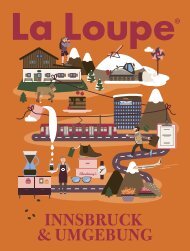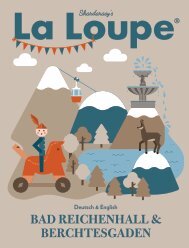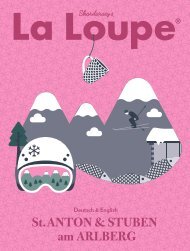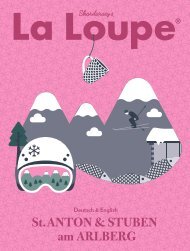No. 3 - Winterausgabe 2019_20, Salzburg
Create successful ePaper yourself
Turn your PDF publications into a flip-book with our unique Google optimized e-Paper software.
But we do put up with bad coffee and that’s a desaster.”<br />
Italy stands for good coffee culture: neither the coffee nor the<br />
machines are better “but you deal with the products, with<br />
leisure and passion.” In Austria people who are fresh out of<br />
a hotel management school don’t know how to properly set<br />
and adjust a coffee machine.<br />
Incorrect processing can ruin the best bean. And since many<br />
coffee machines aren’t adjusted properly they over-extract<br />
the coffee which makes it taste bitter. But: “When it comes<br />
to roasting we leave a buffer in our beans to make sure that<br />
even if the brewing process is bad the coffee still tastes good”,<br />
Rafael Schärf continues. “You can do that by increasing the<br />
sweetness, for example. Which is also why milk goes so well<br />
with coffee, by the way. 80 or 90 percent of our coffee is<br />
consumed with milk, in cappucinos or latte macchiatos.”<br />
Da <strong>Salzburg</strong>er currently offer seven coffee blends that are<br />
named after different musical genres, from “Klassik” to “Jazz”<br />
all the way to “Indie Pop”; two blends are organic and one is<br />
organic and fair trade. “Organic coffee used to be undrinkable”,<br />
says Rafael Schärz. “But our blends “Soul” and “Blues”<br />
aren’t just the best tasting if you ask me, they’re among my<br />
favourite kinds of all. Even if the beans that are used for it are<br />
a bit unsightly and often aren’t used because of the way they<br />
look.”<br />
1<strong>20</strong><br />
Kaffeewerkstatt has also found an innovative way of packaging<br />
their products: the beans are filled in recycled kraft<br />
paper, each bag is stamped by hand. There are no labels or<br />
plastics. “In the future we want to develop a deposit system<br />
to avoid waste and deliver the coffee directly in the container<br />
that is has to rest in for ten days after roasting anyway. The<br />
tubs hold four to eight kilos and can be reused. We deliver<br />
regionally and focus on <strong>Salzburg</strong>. That’s enough. I don’t have<br />
to produce 500 tonnes of coffee every year.”










